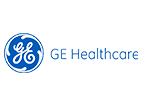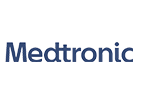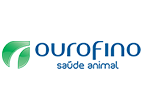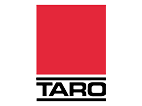Analyzing Impact of COVID-19 on North America Organic Electronics Market
Evaluating Financial Stability During & Post Pandemic
We understand the intense effect of the coronavirus on numerous businesses across the globe, affecting the opportunities, marketing strategies, and pricing models, that are further affecting the growth of the businesses worldwide. We provide updated pointers in this economic pandemic to help the conglomerates to sustain in these uncertain and challenging times and ensure that they take affirmative business decisions. Know More
The Research Report is Updated with 2022 Base Year, 2023 Estimated year and Forecast till 2033 with Market Insights.
With the dip in global production, the GDP has contracted in 2022 and impacted the market across the world. Upon placing a Sample Request, you will receive an updated report with 2022 as base year, 2023 as estimated year and forecast to 2033. This will have market drivers, recovery rate in the market, insights and competitive analysis.
Introduction and Overviews
The North America Organic Electronics market is anticipated to witness a steady growth, considering its tremendous growth potential and various technological advancements that are taking place in the information technology industry in the region. Investment in Information and Communication Technology (ICT) has been considerably high in the region and have generated substantial returns over the past decade. The use of Artificial Intelligence (AI) and Internet of Things (IoT) is slowly changing the way humans will be operating their daily activities in every sphere of life. According to International Telecommunication Union (ITU), about 404,577,397 mobile-cellular telephone subscriptions were registered in the U.S., while Canada registered around 33,082,000 subscriptions as of 2018, as compared to 395,881,497 subscriptions registered by U.S. as of 2016 and 30,752,000 subscriptions registered by Canada as of 2016. The mobile cellular subscriptions in Canada recorded a growth rate of 1.08x, whereas, U.S. mobile cellular subscriptions recorded a growth rate of 1.02x between 2016 and 2018. Currently, the most advanced software and information technology (IT) services is operated by the United States of America (U.S.). Around 30% share is held in the tech sector by the U.S. Information Technology (IT) industry across the world as of 2018. Further, a minimum of 72% of investment is estimated to be contributed by hardware and services segment. The region of North America recorded a GDP of USD 22,213.25 billion as of 2018 as against a GDP of USD 16,611.33 billion generated in the year 2010 at a growth rate of 1.34x. Our overall market study offers extensive analysis on market scope as well as the growth per annum for North America Organic Electronics market in terms of revenue, market segmentations, and gain indicators stimulating the growth of the market. In order to stay ahead of the game, our report highlights market restraints, opportunities and trends that are dominant and are impacting the growth of the market. The North America Organic Electronics market is estimated to record notable absolute $ opportunity value in 2027 as compared to the value achieved in 2019.
The North America Organic Electronics market analysis comprise of advanced insights and strategies to provide 360° approach to contact potential customers along with risk analysis covering supply and demand risks that are affecting the growth of the market. Additionally, the report covers regression and correlation analysis that display relationship between independent and dependent variables.
Top Macro-Economic Indicators Impacting the Growth:
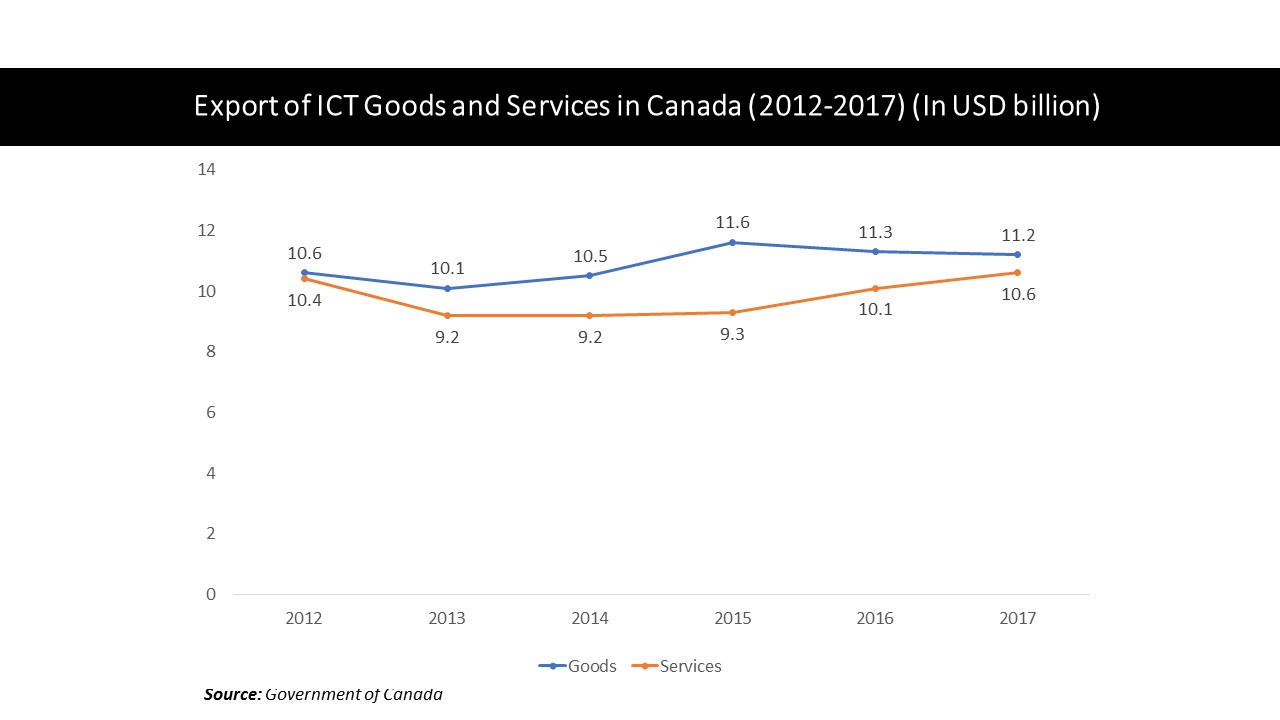
The entry of 5G technology is anticipated to open opportunities for applications in various industries such as healthcare, retail, manufacturing, transportation and others. The North American region is anticipated to adopt 5G technology at a faster rate and at least 45% of the population in North American region are expected to adopt 5G technology by 2023. This is owing to massive demand for mobile data and video streaming services from among the consumers in the region. Moreover, the export of ICT goods and services in Canada generated revenues of USD 21.8 billion in 2017 as compared to USD 21.1 billion of revenues generated in 2012. Telecom operators are anticipated to undergo several changes in their methods of conducting their operations. Moreover, connected cities, connected homes and connected cars could offer a window of opportunities for the telecom businesses to conduct their operations more efficiently in a connected environment.
As per the statistics released by United Nations Conference on Trade & Development (UNCTAD), the U.S. ranked first among the top ten importers of ICT goods with an import value of USD 343,650 million recorded in 2017, covering 16.16% of the world’s share. Moreover, the U.S. recorded an annual growth rate of 9% for the period 2016-17 according to UNCTAD. The share of ICT goods as a percentage of merchandise trade in U.S. had increased from 8.88% in 2013 to 9.49% in 2017 at an increased percentage point of 0.61.
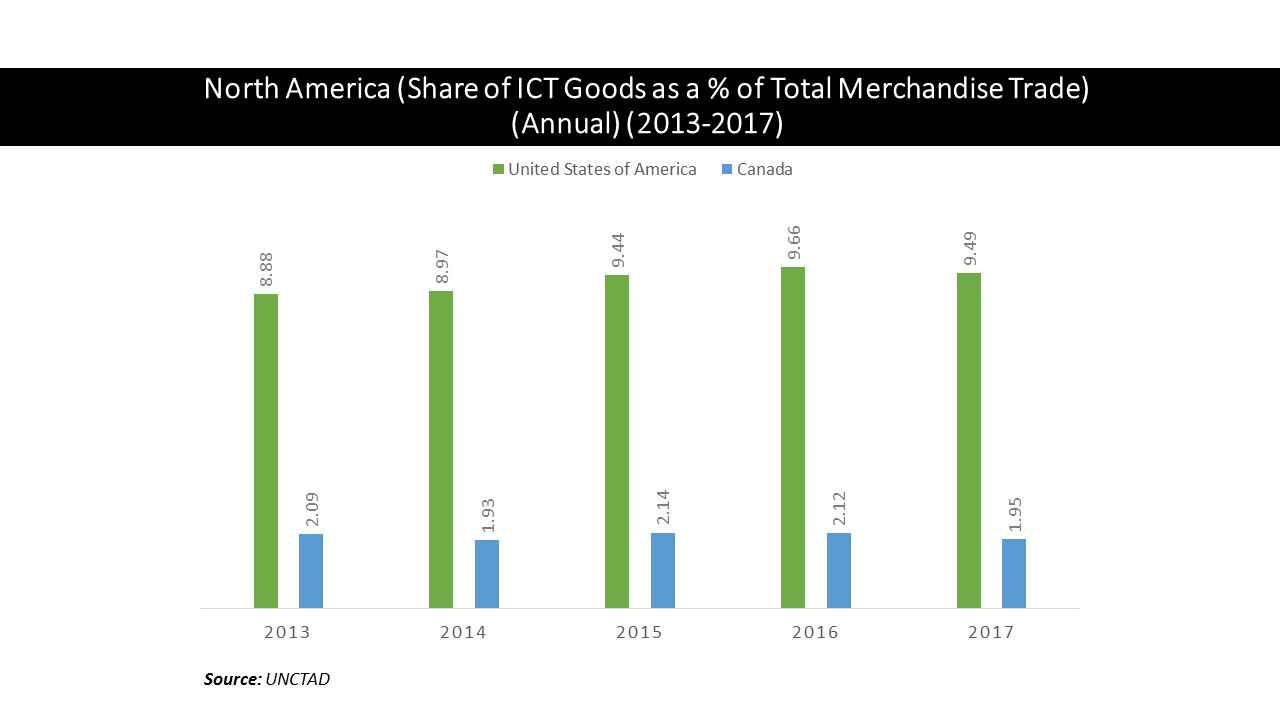
As per the statistics released by World Development Indicators (WDI), the GDP of U.S. was estimated to be close to USD 20,494,100 million in the year 2018, that covers around 23.89% of the world’s GDP share and around 92.26% of the share of North America. With digital technologies becoming prominent and a major determinant of economic growth, ICT is anticipated to play a major role in affecting the lives of the population in the region which could affect the economic well-being of the population in the region. The expenditure on Research & Development in the U.S. as a percentage of GDP stood at 2.80% as of 2017 from 2.72% as of 2013 maintaining a percentage point increase of 0.08 with a growth rate of 1.03x. Further, the research and development expenditure in Canada as a percentage of GDP stood at 1.585% as of 2017. According to IMF, the number of individuals using the internet per 100 inhabitants were about 77.6% in 2018.
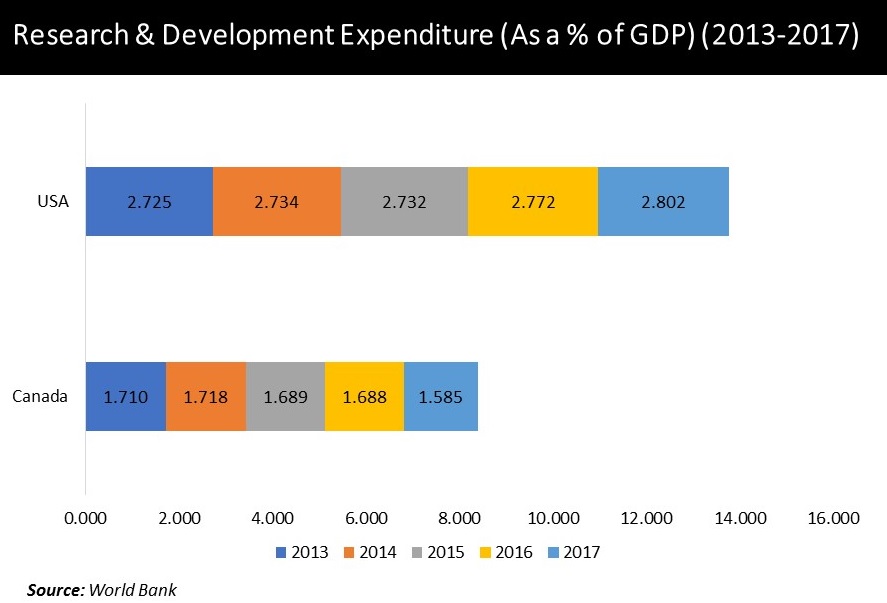
Export and Import Scenario:
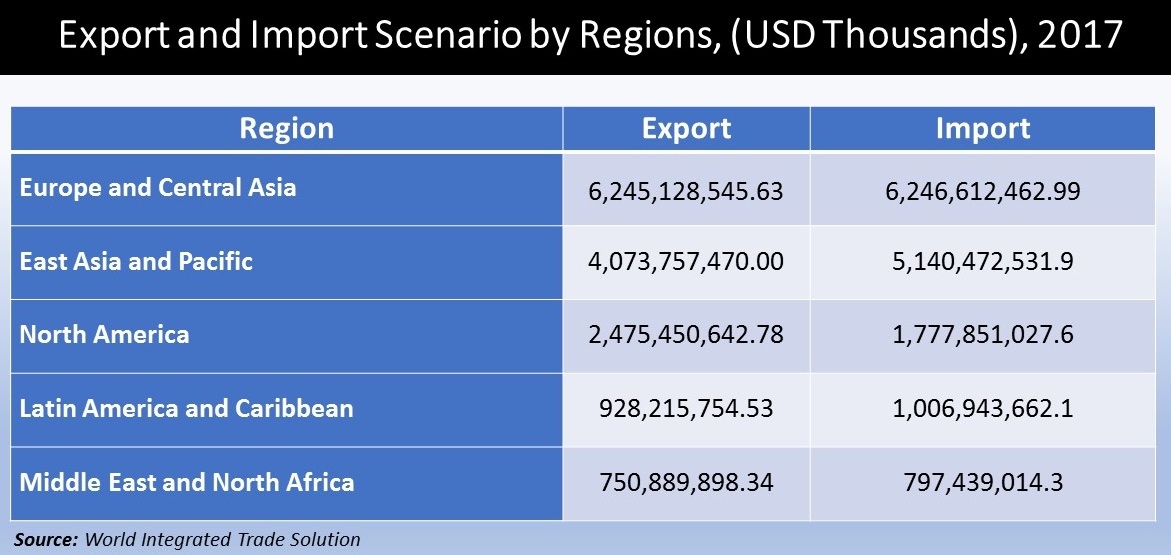
Geographic Overview
A separate section in the report highlights regional scenario in market which includes North America (further segregated into U.S. and Canada).
The report further includes a section on European region which is further segmented on a country/regional level including Germany, U.K., France, Italy, Spain, BENELUX, Netherlands, NORDIC, Poland, Hungary, Russia, Turkey, and Rest of Europe.
In the Asia Pacific Organic Electronics market, the report studies China, India, South Korea, Indonesia, Malaysia, Japan, Australia, New Zealand and Rest of Asia Pacific. In the Latin America section, an in-depth analysis on Mexico, Brazil, Argentina and Rest of Latin America is covered. Middle East and Africa region have been further identified for the Organic Electronics market demand and segregated into Israel, GCC (Saudi Arabia, UAE, Bahrain, Kuwait, Qatar, Oman), North Africa, South Africa and Rest of Middle East and Africa.
Competitive Landscape
A complete section on competitive landscape provides an understanding of the companies in current strategic report based upon various parameters which includes overview of the company, business strategy, major product offerings, key performance indicators, risk analysis, recent development, regional presence and SWOT analysis. There is a separate section which has been provided on the market share of key players in this market, as well as the competitive positioning of the players.
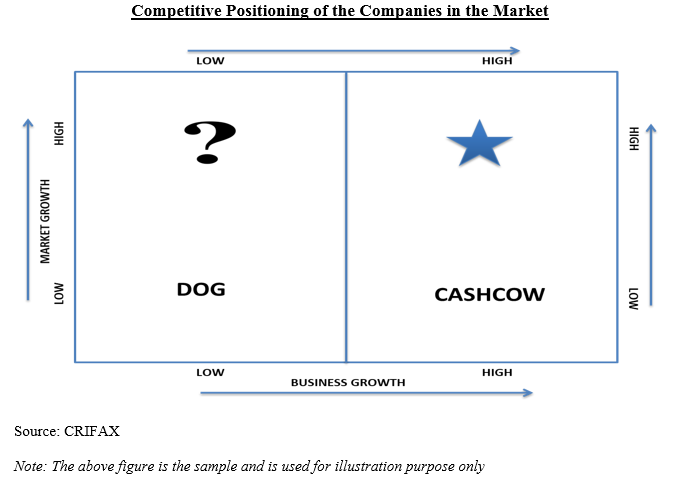
Key Players
- ITRI International Inc.
- Asahi Kasei Corporation
- DuPont de Nemours, Inc.
- Sony Corporation
- BASF SE
Key Topic Covered
- Market Size, Demand, Y-o-Y Growth Comparison
- Market Segmentation Analysis
- Market Segmentation Analysis by Geography
- North America (U.S. and Canada)
- Latin America (Brazil, Mexico, Argentina, Rest of Latin America)
- Europe (Germany, France, UK, Spain, Italy, BENELUX, NORDIC, Russia, Poland, Turkey, Hungary, Rest of Europe)
- Asia Pacific (China, Japan, India, South Korea, Indonesia, Malaysia, Australia, New Zealand, Rest of Asia Pacific)
- Middle East and Africa (GCC, North Africa, South Africa, Rest of Middle East and Africa)
- Absolute $ Opportunity
- Regional Average Pricing Analysis
- Demand and Supply Risk
- Regulatory Landscape
- Regression and Correlation Analysis
- Porters Five Force Model
- Market Dynamics
- Growth Drivers
- Demand Side Drivers
- Supply Side Drivers
- Economy Side Drivers
- Challenges
- Trends
- Opportunities
- Growth Drivers
- Macro-economic Indicators impacting the growth of the market
- Competitive Landscape
- Market Share of the companies
- Competitive Positioning of the companies
- Overview of the companies
- Key Product Offerings
- Business Strategies
- Financial Performance
- Key Performance Indicators
- Risk Analysis
- SWOT Analysis
- Recent Developments
- Regional Presence
Major Target Audience for this report:
- Manufacturers of the product
- Suppliers of raw materials
- Distributors
- Strategic and management consulting firms
- Investors
- Investment banks
- Various regulatory and Government bodies
- Industrial Associations
- Research Organizations and institutes
- Organizations, alliances and forums related to this market
Crucial Questions Answered in this report:
- How the market is going to be impacted based upon the macroeconomic indicators?
- What are the various opportunities in Organic Electronics market?
- Which segment and which country has the fastest growth?
- Complete analysis of the competitive landscape
- Where the maximum opportunity lies in terms of further investments by region?
- Potential countries for investment
Scope for the Customization:
We are open for the customization of this report for our client.

